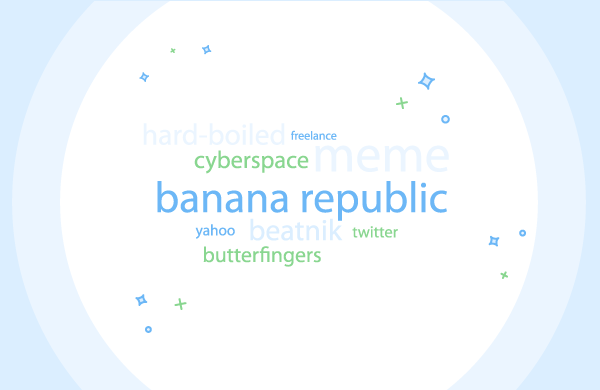Writers are definitely good at creating new words. It is one thing to just invent a word, but it is a whole other thing to create a great word that will be widely used by future generations.
[Tweet “Some neologisms were coined back in 50-60-70s or earlier, but only recently became widely used.”]
Here are some great examples of neologisms introduced by writers and their stories:
Banana republic
This word was introduced by O. Henry in his book of collected works Cabbages and Kings. It later became a term exploited in politics and it stands for a politically unstable country dependent on a product exported (bananas, for example).
Tropico is the excellent nation-builder game that simulates a Caribbean banana republic during the Cold War. The Daily Beast.
Beatnik
Jack Kerouac, the voice of the Beat Generation, actually invented the term “Beat Generation”. “Beatnik” was suggested by Herb Caen, a San Francisco columnist, similarly to the Russian word “sputnik”, which was popular at that time. The term stands for a person associated with the “Beat Generation”.
He was far, far different than the laughing, beatnik jabbering, youngster he had always seemed. Black Man’s Burden.
Cyberspace
William Gibson coined this word first in his sci-fi short story. It became better known after his novel “Neuromancer” was published a few years later.
This time Kate didn’t hesitate pressing send and watched her mail vanish from the out-box into cyberspace. Fallen Woman.
Freelance
This up-to-date term appeared long ago, when Walter Scott suggested it for the first time. According to his novel Ivanhoe, ”Free Lances” were hired as militants for a fee.
As a freelance writer, I depend for my living on easy relations withmagazines, creative-writing departments, and so on. The Daily Beast.
Hard-Boiled
It means tough when speaking about personal traits of character. What’s more, thanks to this term, a hard-boiled fiction genre appeared later. It stands for a detective story in which a cool cynical detective deals with crimes.
Because it lacks the stylish voice of a hard-boiled detective noir, it sometimes feels coldly industrious. The Daily Beast.
Butterfingers
Charles Dickens introduces this term in his “The Posthumous Papers” of the Pickwick Club book in 1836 and it stands for a clumsy person.
And, as every boy in the world knows, it is a great disgrace to be called “butterfingers.” Half-Past Seven Stories.
Chortle
No surprise this term belongs to the great inventor Lewis Carroll as well as the number of other fancy words. It’s made of “chuckle” and “snort”. You can only image the sound.
They will not actually steal, but they will cheat you every time and chortle over it. The American Egypt.
Doormat
Charles Dickens again. Speaking about a person “doormat” was first used in Great Expectations.
His rookie flailing set back the peace process (such as it was) and made him look like a doormat. The Daily Beast.
Factoid
It is a doubtful fact presented in the press without any extra proofs. People usually accept it as true, but unfortunately it’s not true. It was introduced by Norman Mailer.
McCarthy contributes the factoid, “We have four million more government jobs in America than manufacturing jobs.” The Daily Beast.
Feminist
“Féministe” came from the French language thanks to Alexandre Dumas and it suited public taste.
Marjorie Wilkes Huntley was a New Age feminist, a widow, and a librarian. The Daily Beast.
Gremlin
Gremlins, small beings, which caused mechanical problems in aircraft, appeared in Roald Dahl’s story for the first time.
Whatever the gremlin was, it wasn’t exactly an auspicious start for a fifty million-mile hop. Deepfreeze.
Meme
Can you imagine that this word was not coined in the 2000s? Everybody talks about memes, everybody creates memes nowadays. However, it was a faraway 1976 when Richard Dawkins invented it.
“He was constantly dealing with this meme of not being able to close the deal,” Jurkowitz says. The Daily Beast.
Nerd
This word was presented along with some other weird creatures’ names coined by Dr Seuss: it-kutch, preep, proo, nerkle, seersucker. However, only nerd survived. The term stands for a boring person.
She was one of the only female characters I could think of that was different and weird without being the nerd. The Daily Beast.
Oxbridge
First, Oxbridge was introduced as a fictional institution in William Thackeray’s novel. And then it started to stand for a combined name of Oxford and Cambridge.
And, without removing his hobnails, or his corduroys, he sprang lightly into the Oxbridge racing-boat. Punch, or the London Charivari.
Pedestrian
There was no word to name a person walking on foot, until William Wordsworth invented it.
The Crisis in American Walking Tom Vanderbilt, Slate How we got off the pedestrian path. The Daily Beast.
Scientist
William Whewell wrote “The Philosophy of the Inductive Sciences”, in which he expressed perplexity regarding the fact there is no name for a person dealing with science. This way “scientist” was born.
Skill as a scientist and skill as a writer rarely inhabit the same person, but when they do, the results can be incredible. The Daily Beast.
Workaholic
Dr. Wayne Oates set this word, when wrote his book Confessions of a Workaholic: The Facts about Work Addiction. The suffix -holic denotes addiction, as in the word “alcoholic”. Oates viewed work as a kind of addiction as well.
The workaholic with the love of white suits and the slogan, “Let’s KeepMoving!” The Daily Beast.
This onomatopoeic (phonetic imitation of sound – twitting in this case) word is prescribed to Geoffrey Chaucer. He seems to be a great contributor to the English language dictionaries in that he provided them with a number of original words.
To catch the “real” tweeter, Weiner explained that he had hired an Internetsecurity firm to investigate. The Daily Beast.
Yahoo
Who on earth doesn’t know this word now? However, not every person is aware of its origin. The word “Yahoo” was first presented in Jonathan Swift’s novel Gulliver Travels. Yahoos were primitive cruel creatures with materialistic attitudes.
When will the Left learn that this is not simply a nation of dimwitted yahoos? The New York Times.
Did you find our blog post interesting? Feel free to share it on Facebook or Twitter by using the super-easy share buttons on the left and check out our plagiarism checker for universities!




